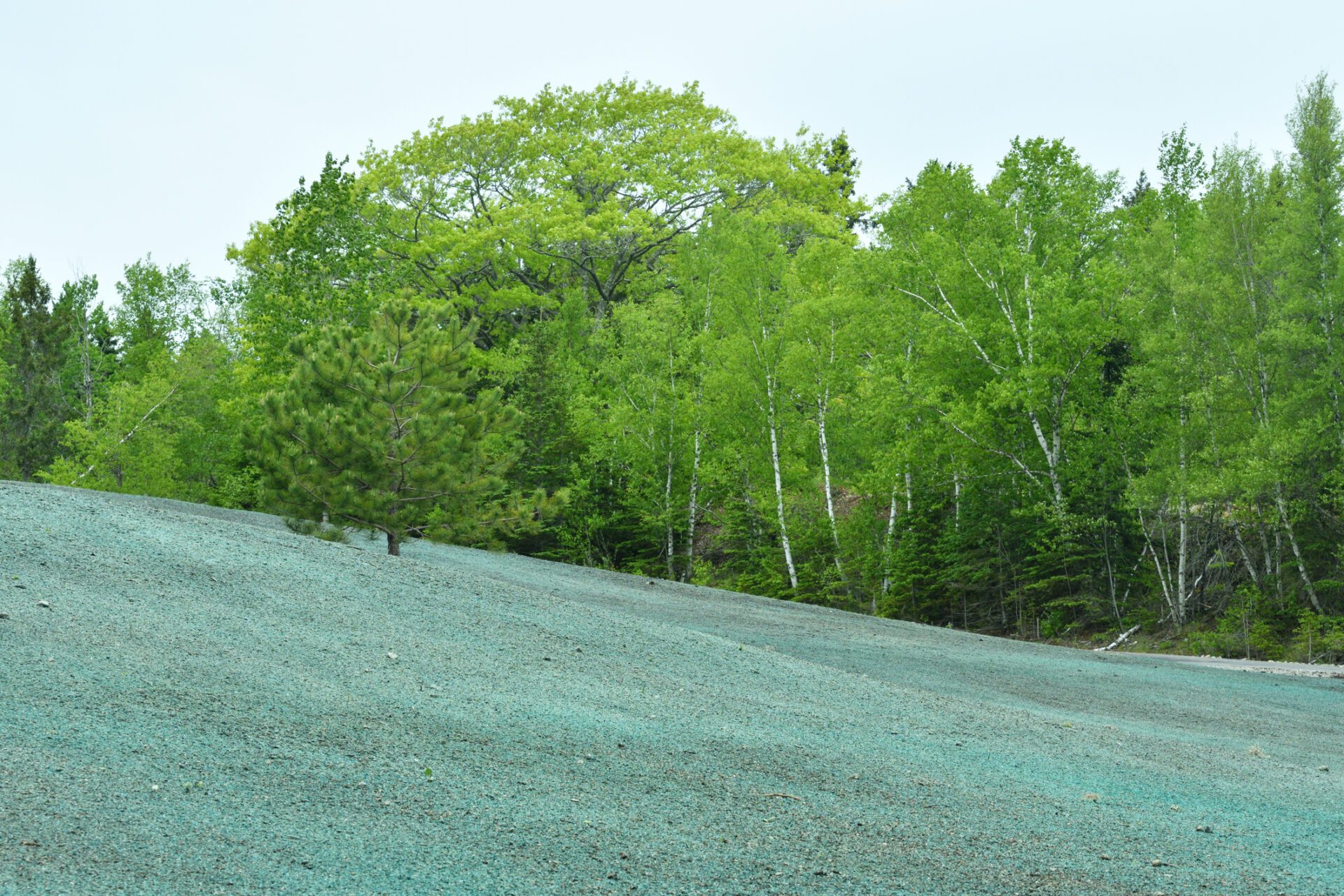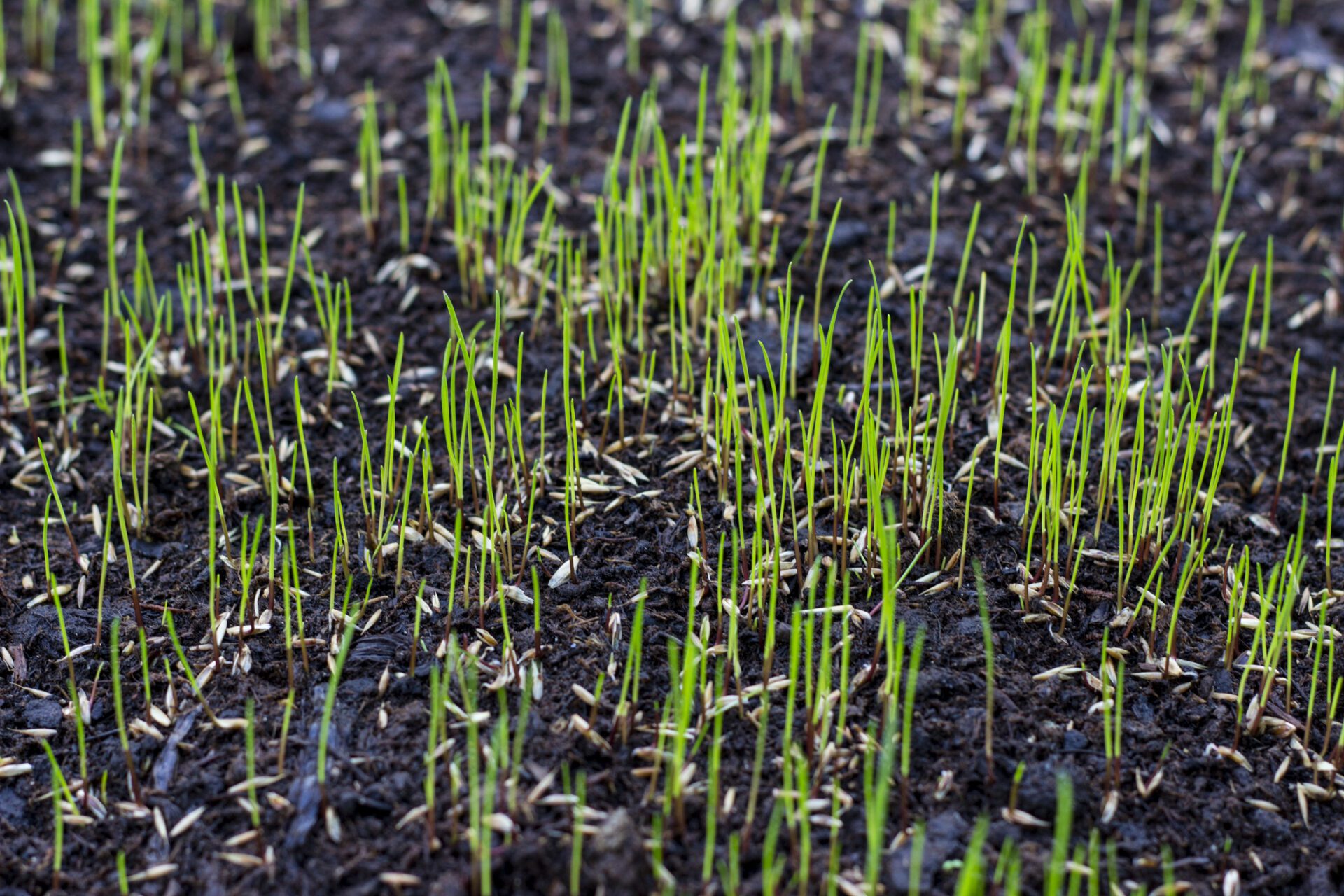Which is Better: Hydro Seed or Grass Seed?
Which is Better: Hydro Seed or Grass Seed?
As a business owner, property manager, or even a homeowner, maintaining your landscape is integral to creating a welcoming environment. For those responsible for a commercial property or residential community, choosing the right type of grass is critical to the success of a lush lawn.
And with so many options on the market, it can be challenging to know where to start. Laying sod while providing an instant lawn can be expensive, so two popular choices are hydroseed and grass seed.
While both have benefits and come in various grass species, the key is determining which option is right for your needs. So, which is better: hydroseed or grass seed? Dive into the difference between hydroseed and grass seed to make the right choice for your property.

What is hydroseed?
What is Hydroseed?
Hydraulic mulch seeding, or hydro seeding, is a blend of grass seed, mulch, fertilizer, and water sprayed onto a prepared surface. The mixture forms a seedbed that provides a conducive environment for grass to grow. One of the primary benefits of hydro seeding is it provides even coverage.
Hydro seed is sprayed uniformly, which means all parts of the surface receive an equal amount of the seed mixture used. As a result, hydro seed often yields quicker and stronger growth and can even be applied over a large area in a short time. This makes it an excellent option for commercial properties and large residential projects.
What is Traditional Grass Seed?
Grass seed is a traditional and widely used method of starting a lawn. It is a small, lightweight seed sown onto a prepared surface. Unlike hydro seed, grass seed is not mixed with mulch or fertilizer. One of the primary benefits of using grass seed is it requires less water than hydro seed. It also allows for greater flexibility, as you can choose which type of grass seed to use depending on your climate or soil type. Grass seed can also be more cost-effective than hydro seed, especially for small-scale projects.
The appearance of a hydroseeded lawn versus a traditional seeding
Hydroseed produces a higher-quality lawn compared to grass seed since the seed mix tends to produce beautiful, thick, and healthy grass. Hydro-seeded lawns will grow uniformly since the seed is evenly distributed, unlike grass seed. Also, a hydro-seeded lawn generates enough deep grass from its roots, which helps the grass photosynthesize better and helps resist soil erosion. Hydroseeded lawns are generally greener and fuller over the years than those planted using grass seed.
Which costs more, hydroseeding or grass seed?
The cost of hydroseed versus grass seed varies depending on several factors. However, hydroseed is generally more expensive than grass seed due to the added cost of mulch and fertilizer. Depending on the size of your project, this cost difference could be significant. On the other hand, if you have a large property and need quick coverage, hydroseed might be the more cost-effective option than grass seed.
What’s the Durability of Hydroseed Lawns?
Hydroseeded lawns have a much better chance of surviving severe weather conditions than those planted using grass seed. The reason for this is the seed mix encourages faster seed germination, which means the seedlings can take root quicker and establish roots before the heat of summer or the cold of winter hits. The mulch in the hydroseed mixture provides new grass with additional protection and insulation against temperature fluctuations and wind, which can help the grass take root more quickly.
Hydro-seeded lawns will also have deeper roots than grass-seed lawns. This can help established grass stand strong in a variety of weather conditions. Grass seed, while still durable, may require more upkeep, especially during its early stages of growth.
How Do You Maintain Hydroseed or Grass Seed?
Both hydroseed and grass seed need maintenance and care, but hydroseed requires slightly more watering for grass growth and the same maintenance as a traditional seeded lawn. If you’re hoping to avoid heavy watering requirements, grass seed might be better, but hydroseed is just as low maintenance. For both hydroseed and grass seed, you must plan to frequently water the area, especially during the first few months, to encourage root development.
Climate Considerations
Choosing between hydroseed and grass seed might also depend on your climate. Hydroseed is well-suited for drier climates, while a traditionally seeded lawn does better in areas with more moisture. Additionally, hydroseed can be used year-round in some regions. In contrast, grass seed typically requires specific temperatures and soil moisture conditions to thrive.

Prepare your soil before planting a new lawn.
Preparing Your Yard for Installation of Hydroseed or Grass Seed
With a general understanding of hydroseed or grass seed, you may ask yourself what is required to successfully install either of these options to establish a lawn.
Clear the Site
Before installation, ensure the site is clear of debris, such as rocks, weeds, or trash, exposing the bare soil and removing unnecessary items that may disrupt growth. Chunks of dirt and stones can cause low spots and shadowing, which poses a risk to a healthy lawn. Clearing the site is fundamental for grass seed and hydroseed to flourish.
Soil Conditioning
Next, consider testing the quality of your soil and condition. Growing the wrong type of lawn on bad soil could reduce the lifespan of your lawn. Using basic soil test kits available at gardening outlets, you can test your soil’s pH levels and quality. After testing the soil pH levels, if the soil is too acidic or alkaline, you may need to balance it with lime or sulfur. Adding soil amendments can help improve the soil’s overall quality, which can ensure the overall health of the grass when establishing a lawn. For more compact soil, you may need to aerate the soil to increase airflow and drainage.
Water and Irrigation System
The preparation of lawn irrigation systems before installation is another crucial factor. If you have a commercial irrigation system ensuring it’s suitable and operational can be successful with both hydroseed and grass seed projects. A functional and automated irrigation system allows essential nutrients and moisture access to the grassroots, aiding their healthy growth, and ensuring deep roots for a prosperous lawn. Setting it for scheduled watering can also be key to establishing a new lawn.
Fertilization
Applying organic fertilizers or other organic soil products can help to prepare the soil for planting either type of seed. A well-fertilized starting point is essential for the appropriate growth of the new grass seed. You can incorporate acceptable compost or manure to enhance the soil nutrient spectrum. Also, feeding your lawn consistently after hydroseed or grass seed installation can help to increase nutrient uptake, leading to vital root development and a robust and beautiful lawn.
Timely Seeding – Choosing The Right Time to Grow Grass
One of the most significant factors you need to consider before hydroseeding or sowing grass seed is the time of its installation. Choosing the correct time to plant seed is critical to ensuring proper germination and rooting. This usually means planting during milder conditions as it helps with keeping the ground moist and reduces the risk of burning the grass due to heat. In Minnesota, the best time to seed your lawn is in late summer or late October, just before the winter season.

When should I plant grass in Minnesota?
Conclusion
Laying sod is fast but expensive, so lawn establishment through seeding is a great option. Determining which is better hydroseed or grass seed depends on your specific needs. Hydroseed might be your best bet if you’re working on a large project, while traditional seeding may be more suitable for smaller-scale projects.
Hydroseed offers quicker and more even coverage with erosion control and grass growth can withstand harsh conditions and foot traffic better, but it can cost more. Meanwhile, grass seed is more versatile and can adapt to various climates and soil types. Understanding the pros and cons of each option will help you make the right choice for your lawn.
If you’re in the Minneapolis area and have questions regarding a sod lawn versus hydroseed or the different types of grass seeds and how they may work better for your existing lawn consider scheduling a consultation.
All Metro can help you establish a beautiful new lawn. Contact us today.
Looking for more information?
Call us today at 763-789-4788 to receive a free estimate on any of our property services.
Free Estimates
on all Services
Use the form below to request a free estimate on any of our services.






